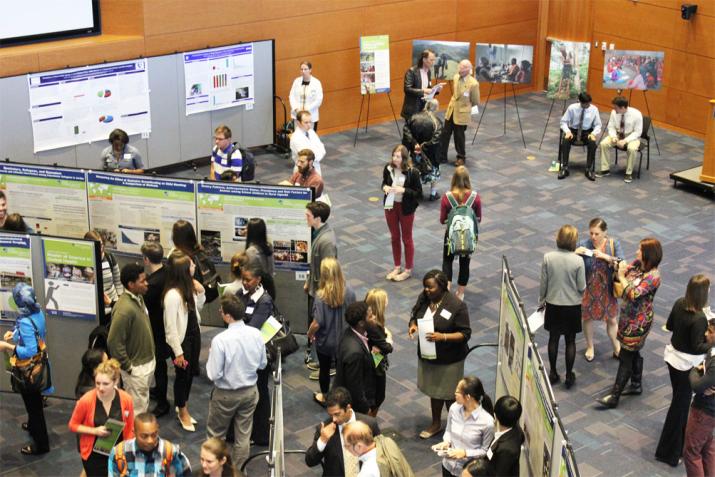
Published October 28, 2014, last updated on April 9, 2018
The Duke Global Health community was well represented at the third annual Global Health Showcase last Wednesday night, with over 150 guests in attendance ranging from Duke students, faculty, staff and to members of local organizations such as International Partnership for Innovative Healthcare Delivery (IPIHD) and IntraHealth International. Over 50 posters representing more than 100 undergraduates, medical fellows, and masters and doctoral students displayed research findings at two different poster sessions, reflecting DGHI's commitment to academic diversity and multidisciplinary approaches.
Randy Kramer, Deputy Director of Duke Global Health Institute, opened the Global Health Showcase with warm remarks of DGHI’s commitment to fostering student research and announced the winners of the 2014 photo contest. DGHI associate professor David Boyd then gave a short presentation stressing the importance of understanding traditional medicine, and three student presentations followed Boyd’s opening to reinforce the value of traditional practices in communities around the world. The 2013 Student Research Training (SRT) team presented their research on traditional medicine beliefs and utilization in Guatemala, and two Robertson Scholars took the audience through a visual narrative of traditional medicine in modern-day India.
John Stanifer, MD, MSc followed these presentations with a discussion of his ongoing research on the ways traditional medicine is used in the general population. Currently this work focuses in urban and rural districts of Tanzania, yet this research will provide a model that can be generalizable across other populations.
The student poster exhibition highlighted projects focusing on a range of global health topics from maternal and child health to zoonotic diseases. The event allowed students to receive feedback on their field research findings and offered a supporting environment for them to share their data prior to shaping these findings into theses or manuscripts. Students said one motivating factor of presenting their data was receiving this input from students and faculty of different health backgrounds and perspectives. Students also said sifting through all their data and condensing it into a visually pleasing and concise manner was a challenge tasking, helping them grow as scholars in the field.
